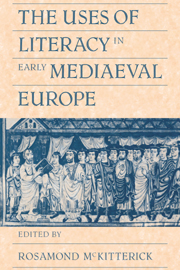Book contents
- Frontmatter
- Contents
- List of illustrations
- Contributors
- Preface
- Abbreviations
- Introduction
- 1 Literacy in Ireland: the evidence of the Patrick dossier in the Book of Armagh
- 2 Anglo-Saxon lay society and the written word
- 3 Administration, law and culture in Merovingian Gaul
- 4 Literacy and the papal government in late antiquity and the early middle ages
- 5 Literacy and the laity in early mediaeval Spain
- 6 Aspects of mediaeval Jewish literacy
- 7 Writing in early mediaeval Byzantium
- 8 Literacy displayed: the use of inscriptions at the monastery of San Vincenzo al Volturno in the early ninth century
- 9 Royal government and the written word in late Anglo-Saxon England
- 10 Literacy in Carolingian government
- 11 Text and image in the Carolingian world
- Conclusion
- Index
10 - Literacy in Carolingian government
Published online by Cambridge University Press: 07 December 2009
- Frontmatter
- Contents
- List of illustrations
- Contributors
- Preface
- Abbreviations
- Introduction
- 1 Literacy in Ireland: the evidence of the Patrick dossier in the Book of Armagh
- 2 Anglo-Saxon lay society and the written word
- 3 Administration, law and culture in Merovingian Gaul
- 4 Literacy and the papal government in late antiquity and the early middle ages
- 5 Literacy and the laity in early mediaeval Spain
- 6 Aspects of mediaeval Jewish literacy
- 7 Writing in early mediaeval Byzantium
- 8 Literacy displayed: the use of inscriptions at the monastery of San Vincenzo al Volturno in the early ninth century
- 9 Royal government and the written word in late Anglo-Saxon England
- 10 Literacy in Carolingian government
- 11 Text and image in the Carolingian world
- Conclusion
- Index
Summary
THE CONTEXT OF LITERACY
Nearly forty years ago, Ganshof published ‘The use of the written word in Charlemagne's administration’. That paper, in only eighteen pages, provided a comprehensive survey, and a lucid classification, of the documentary evidence, especially the capitularies, of Charlemagne's reign. Ganshof's study remains fundamental. The limited aim of the present paper is partly to supplement it, partly to set the material in a different context. Literacy can be examined, not just in quantitative terms of measurable ‘uses’, but in qualitative terms, as a form of ideology through which power is constructed. The adjective ‘written’ refers to things, ‘literate’ to persons. Hence in dealing with literacy rather than with Ganshof's ‘written word’, I hope to consider aspects of social practice with which Ganshof was not concerned.
Ganshof's definition of ‘administration’ rested on a sharp distinction between ‘written records’ used ‘to furnish proof of individual rights’ and ‘documents which formed part of an administrative routine’. Implicit here is a further distinction between the private and public domains. Only the latter came within Ganshof's purview: for him, administration was the sphere of the state. But what in the Carolingian period was the public domain? Was there a Carolingian state at all? Such questions – and they are important ones in the history of political ideas – have generated much debate precisely because the categories they employ are hard to pin down to early mediaeval realities.
- Type
- Chapter
- Information
- The Uses of Literacy in Early Mediaeval Europe , pp. 258 - 296Publisher: Cambridge University PressPrint publication year: 1990
- 10
- Cited by



